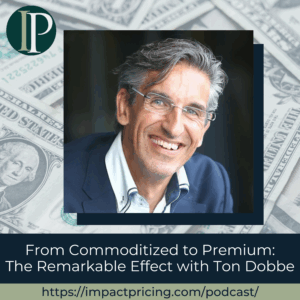
Loren coaches service-based entrepreneurs to shift away from the trap of the “dollars-per-hour” business model to a value-based model that has, in some cases, allowed her clients to reduce workload by as much as 50% while doubling revenues.
In this episode, Loren shared about why most service-based entrepreneurs are underpricing themselves and how she helps them truly price based on value and how hourly-based pricing is not being fair to them and their clients.
Podcast: Play in new window | Download
Why you have to check out today’s podcast:
- Know how to price yourself and services right
- Learn why billing by the hour is a disservice to you and your service
- Why you should you never underprice yourself and your services so no money is left in the table
“It’s not one-set price unless you’re looking at it from a subscription-based model, which is, it’s really having what I call a value conversation where you’re asking the client great questions and then you’re pricing the client, not the service.”
– Loren Fogelman
Increase Your Pricing Knowledge: Become a Champions of Value INSIDER!
To sign up go to insider.championsofvalue.com.
Topics Covered:
01:18 – How Loren got into Pricing
02:45 – What is “The Ultimate Pricing Bootcamp” and who is this for
05:54 – How to price an accountant’s service or project offer
11:41 – Who are her target clients
12:02 – Who is her speaking clients and what type of clients are they
13:07 – Introverts versus extroverts
13:46 – Her best pricing advice
14:27 – Why do clients underprice themselves and how does she help solve their problem on this matter
Key Takeaways:
“What we want to do is recognize that the clients aren’t buying their time. It’s just that culturally they’ve been trained to ask what’s your hourly rate? And also accounting professionals have been trained as employees to clock in and clock out for their services. That’s not really the highest value, all their clients want to know is can you deliver on your promises and can I trust you to do that? That’s really what they primarily want to do and the faster the better.” – Loren Fogelman
“We price it according to what the client values instead of what they value as the practitioner. And that is really the key piece is stepping into your client’s shoes to understand how they view the value of what you offer instead of looking at it from where you are.” – Loren Fogelman
“What I would say is to understand that pricing is not what you think it is. The majority of professionals, from my research, 57% of the professionals actually underpriced their services. If you are trying to price it yourself, you’re probably leaving money on the table.” – Loren Fogelman
“One of the things that I do with a lot of my clients, because they know that they undervalue themselves, is we’ll get on a call together, I will review their packages. Maybe they have a proposal coming in and we will go ahead and create the packages and actually price it together because if it was left up to their own devices, they would base it off of their hourly rate and that’s not really going to help them make more money without having to work harder.” – Loren Fogelman
People / Resources Mentioned:
Connect With Loren Fogelman:
Connect with Mark Stiving:
- Email: [email protected]
Full Interview Transcript
(Note: This transcript was created using Temi, an AI transcription service. Please forgive any transcription or grammatical errors. We probably sounded better in real life.)
Loren Fogelman: It’s not one-set price unless you’re looking at it from a subscription-based model, which is, it’s really having what I call a value conversation where you’re asking the client great questions and then you’re pricing the client, not the service.
[Intro]
Mark Stiving: Welcome to Impact Pricing, the podcast where we discuss pricing, value, and the not so hourly relationship between them. I’m Mark Stiving, today, our guest is Loren Fogelman. Here are three things you want to know about Loren before we start. First, she’s a keynote speaker on value pricing. I’m guessing we have a lot in common. She recently put on the ultimate pricing Bootcamp, which we have to know more about, and I found her because I liked an article that she wrote on accountingweb.com that was titled “The Problem With Answering ‘What’s your hourly rate’?” Welcome, Loren.
Loren Fogelman: Hey Mark, I am so excited to be here. It is going to be juicy today.
Mark Stiving: Well, let’s see. Well, let’s hope. So. How did you get into pricing?
Loren Fogelman: I believe that the topic found me instead of me searching for it as I went to school, my education prepared me for that thing that I do really well, which is helping other people really achieve what they want. However, it also trained me to work for somebody else to be an employee instead of an entrepreneur. When I started to move in the direction of having my own business, I had to figure out three specific things, how to network, especially as an introvert, how to have sales conversations when I didn’t like the sales part, how to price my services because I didn’t want to trade dollars for hours. So I took a deep dive into those things and I found that the pricing piece really spoke to me because I have a background in sports psychology and it’s a whole mindset shift. It’s a paradigm shift as you move in that direction and therefore the mindset, as well as the strategy and the tactical pieces, were just sweet spots for me.
Mark Stiving: I have to tell you, I’m sitting here watching you on Zoom video and I have, and you’ve got this big smile. I have such a hard time believing that you are an introvert.
Loren Fogelman: Well, might on the cusp, it’s called an ambivert. I can be extroverted when I need to, but I love working in my home-based business in my yoga pants.
Mark Stiving: Nice. Well, I’m sitting here wearing jeans so we’re in good shape. So tell us about The Ultimate Pricing Bootcamp. I was going through some of your content. I saw that. And who are you teaching to do watch?
Loren Fogelman: I work primarily with service-based professionals who tried by the hour, the session or the project. If I niche down, my super niche is really accounting professionals. What I teach is how to be able to separate your fees from time because that’s not your highest value. In the pricing bootcamp, it goes into really five core components, which is how to identify your ideal client in your niche. Looking at how to articulate your system.
What is the process that you take your clients from when they first meet you to the very end that helps them get that benefit, result or outcome? The third step is how to bundle a package of services, which takes you away from ala carte selling one-off things into really once again in the outcome and the steps.
Looking at the mindset piece because we all have stuff around money. Some of us have positive stuff, others had some heavy baggage and really starting to unpack that. And then the final part is the pricing piece. How to be able to value price your service, understanding what that is, separating yourself from the billable hour because it’s not fair to you or to your clients.
Mark Stiving: Yeah. So we’ll talk about the fifth one in a second. I love the first four though. Those were really nice. I could see how if you had a room full of accountants and you had a lot of experience working with accountants, you could help them get through that process really well.
Loren Fogelman: Absolutely. Because as you may know with many accountants, they tend to be high achievers. Overthinkers would be a bit risk-averse and therefore they know what they want. However, it takes them a long time sometimes to start to make those changes or that moves. It’s not that they don’t want to, it’s more that they want to reduce the risk and they just need someone else to help show them how to do it correctly.
Mark Stiving: I think that’s awesome. As you were going through those, I was doing them for myself in my mind, and I was imagining how hard it would be for you to pull that out of me because it would be really hard, I think. But having a lot of experience with a specific industry, I think it’s so much easier once you have that.
Loren Fogelman: It might be hard for you to pull it out of yourself. However, I do this all day, every day. Not as hard as you think.
Mark Stiving: Alright. Okay. Good. So now let’s talk about the pricing piece. How do I decide what it’s worth and we know we’re not trading hours for dollars. I’m with you.
Loren Fogelman: Okay. When you say it, what do you mean by it so that we’re both on the same page?
Mark Stiving: Oh, whatever an accountant is going to sell. I assume the answer is a project.
Loren Fogelman: Yes and no. What I believe we really first need to start to define is who your ideal client is because different clients need different things. Therefore, if someone’s a generalist, they might need to have many, many different packages. However, none of them is really the sweet spot because they’re trying to be all things to all people. That is exactly why though. It’s the first step is figuring out who their people are. It could be an industry or it could be a personality type. If we’re talking about an accounting professional, definitely focusing on an industry makes it a lot easier because there are different ways to approach accounting depending on the business that your client is in, but let’s say we know that we also know that outcome that they are delivering to their clients and then we’re going to go ahead and bundle it.
What we want to do is recognize that the clients aren’t buying their time, their clients, even the clock watchers don’t really care about time. It’s just that culturally they’ve been trained to ask what’s your hourly rate? And also accounting professionals have been trained as employees to clock in and clock out for their services. That’s not really the highest value or their clients want to know is can you deliver on your promises and can I trust you to do that?
That’s really what they primarily want to do and the faster the better. So what we look at doing is actually bundling these services together of what they need to do to help their clients have their financials in order or whatever that might be that they’re hiring them for.
And then we price it according to what the client values instead of what they value as the practitioner. And that is really the key piece is stepping into your client’s shoes to understand how they view the value of what you offer instead of looking at it from where you are.
[Insider Advertisement]:
Time out for a quick ad.
Our goal at Impact Pricing is to help you become a champion of pricing and value.
This will undoubtedly increase your impact at your company. It’ll help you get promoted and make your company more profitable.
And now we have an unbelievable offer to push you even further down that path. We just released our new insider program where you get access to all of our current and future courses.
If you just take the courses we currently have released that’s over $2,000 in value. The good news is we release courses that are really faster than one every two months. That’s faster than anybody’s been able to take them. At least so far.
You get access to everything for the low price of just $100 per month. That’s a small portion of the raise that may come with your next promotion.
To make this offer even more irresistible. We offer you your first month for only $5. Try a few courses, see what you learned that’s valuable. We are confident you’re going to want to stick around.
Oh, and did I mentioned you get access to office hours? One hour a week I get on zoom and answer questions from our insiders. Considering I charge $1,000 for one-hour pricing consultation that makes this a no brainer.
Go to insider.championsofvalue.com. To sign up to take advantage of our special $5 offer. Use the promo code ‘INSIDENOW’.
This special offer will end at the end of April 2020. Join me and your colleagues as a Champion of Value Insider. I’ll see you on the inside
Mark Stiving: That’s absolutely spot on. That’s what value-based pricing is, and so now the question becomes how do you figure that out? So you’ve got an accountant in the room, they’ve done the first four steps, they’ve got their ideal client, they’ve laid out the package. Here’s the package I’m going to go sell my ideal client. I need to charge them.
Loren Fogelman: It’s different things for different clients. If you actually look at the essence of value-based pricing according to Ron Baker, who I know you’ve had on the show a couple of times, it’s not one-set price unless you’re looking at it from a subscription-based model, which is what Ron Baker is now doing with value pricing 2.0.
It’s really having what I call a value conversation where you’re asking the client great questions and then you’re pricing the client, not the service. Therefore, I can’t give you a straight answer, but what I can tell you is it’s a little bit odd and a little bit of science. It’s probably more art than science, which means that it’s really messy and accounting professionals don’t like that part.
Mark Stiving: Yeah. So I’ve got to say that you actually did give me a great answer because if I were going to answer it, I would have answered it. Value conversations, but I wanted to hear how you were going to answer it. That was to me, much more interesting.
Loren Fogelman: So how should I get a grade? Was it like an A or B is, that is fantastic.
Mark Stiving: So, your ideal client is, first of all, someone who’s hourly. And secondly, you know, if we’re going to niche it further, it’s an accountant or someone in that accounting space because you know that industry really well. You know how to find them and that’s brilliant.
Loren Fogelman: And they know how to find me, which makes it even more brilliant.
Mark Stiving: So marketing works, doesn’t it? Especially when you can focus. When you go on LinkedIn, you are a speaker. What’s your speaking client? Who do you speak to?
Loren Fogelman: I speak primarily to accounting professionals and I will go ahead and speak to audiences where it’s entrepreneurs who once again charge by the hour, the session, the projec.,
Mark Stiving: Is it usually associations that you find that you’re gonna speak to or do big firms bring you in to talk to their employees?
Loren Fogelman: It’s more, I’m speaking at conferences that might be focused for an example, I’ve spoken at inbound, which is one of the right conferences for people that do marketing. I was a speaker there. They have 24,000 people who come to their conference.
Mark Stiving: Nice.
Loren Fogelman: It was amazing because it was actually a conference of probably 20,000 introverts. I didn’t realize that they were all going to be introverts because they worked behind their computers. It was very, very interesting.
Mark Stiving: Even though they’re marketing people.
Loren Fogelman: They are, however, they all work behind their computers. So they’re doing the backend part of marketing as far as the content creation, the website building, getting the marketing out there onto social media.
Mark Stiving: Okay. I’m going to make a statement. I’ve never said these words before. I will bet you most of the world is an introvert.
Loren Fogelman: Maybe.
Mark Stiving: And I only say that because I only know a few people that I would say are truly extroverts where they’re just super comfortable. They’d rather be around people than by themselves.
Loren Fogelman: But my guess is, let’s go back to, we hang around people who are similar to us. For the most part, if you were an event planner, you would think that the world was made up of extroverts.
Mark Stiving: Hmm. I hang around with a lot of speakers and I still don’t think they’re extroverts. I think they’re, most of them are introverts.
Loren Fogelman: Introverts make great speakers. Let’s just go there.
Mark Stiving: Yeah, let’s just go there. Right. Introverts make great speakers. Absolutely. Awesome. Awesome. So Loren, what’s one piece of pricing advice that you would give our listeners that you think could have a big impact on their business?
Loren Fogelman: What I would say is to understand that pricing is not what you think it is. The majority of professionals, from my research, 57% of the professionals actually underpriced their services. If you are trying to price it yourself, you’re probably leaving money on the table.
Mark Stiving: Yeah, I would think, I would guess that 57% is low.
Mark Stiving: Probably. However, from the research that I’ve been able to find, that’s the number that I could find. There’s not a lot of real research out there.
Mark Stiving: Yeah, yeah. From what I could tell, it seems like most people aren’t confident pricing themselves.
Loren Fogelman: That’s true. One of the things that I do with a lot of my clients because they know that they undervalue themselves, is we’ll get on a call together, I will review their packages. Maybe they have a proposal coming in and we will go ahead and create the packages and actually price it together because if it was left up to their own devices, they would base it off of their hourly rate and that’s not really going to help them make more money without having to work harder. Plus the majority of people, don’t even know how the alleyway came to be.
Mark Stiving: I’m not sure. I don’t know how it came to be either, but…
Loren Fogelman: Well, let, let me go ahead and fill you in. It came about a hundred years ago where there was an attorney. He had to justify his high rates to his clients. He created the alley rate to be able to put a concept or a frame around it and as a result, it’s now something global that people use all over, but if we really understand it, it was made up by an attorney.
Mark Stiving: Attorneys, you got to love them. Loren, this has been fun. Thank you for your time today. If anyone wants to contact you, how can they do that?
Loren Fogelman: They can go to my website, which is businesssuccesssolution.com. If they want to have a conversation with me because they took away something from this, they feel that this would help them. I can be reached at businesssuccesssolution.com/let’stalk and I offer a 15-minute consult to see if you’re ready to go on the pricing journey and double your income working half the time.
Mark Stiving: Nice. I think most people should take you up on that because if you’re charging by the hour, you’re probably not doing it right.
Loren Fogelman: Oh, absolutely. I’ve just found out from one of my clients something that she used to, she was telling me yesterday on a call, something that she used to do for free. She just charged $8,000 for and the person said, yes, therefore there’s money being left on the table. Let’s find it and have you just really earn what you deserve. You make a difference for other people and you deserve to be well-paid for that difference that you make.
Mark Stiving: I’m going to say something really weird. I enjoy losing deals. I like setting prices so high that someone says no , no and I’m not going to buy from you, and I just smile. It’s like, okay, good.
Loren Fogelman: Okay. Then Mark, let me ask you, what is your close rate? Because I use it as a metric as to whether your prices are high enough or not.
Mark Stiving: Mmm.
Loren Fogelman: How many conversations do you have to have before you have a close?
Mark Stiving: So I think that that’s a hard question to answer. An easier question is once I give a client a proposal, what’s my close rate? And I’m probably sitting at about 50%.
Loren Fogelman: Okay. Then either you’re attracting really, really well-qualified clients to you and you’re filtering out the non-qualified ones before they ever have a conversation with you or else you’re ready to go. And we can bump them up a little.
Mark Stiving: Okay. Let’s see. I don’t think anybody would say my rates are too low.
Loren Fogelman: Oh, okay. Well, if you’re getting 50% of the people saying yes to you, I’m actually shooting for between one to four to one to seven.
Mark Stiving: Really. So 25% to, let’s call it 12%.
Loren Fogelman: Yeah. There’s no right or wrong, but I know that your prices are probably more value-based, most people out there, so kudos to you. Yeah. And so all my clients, I’m raising rates. Just so you should know that.
Loren Fogelman: Yeah, that makes me happy.
Mark Stiving: Alright, Loren, that was great. Episode 61 in the can. Let’s see. My favorite part, the fact that I get the raised rates, that’s a really good one. I liked that. What was your favorite part? Please let us know in the comments or wherever you download it and listen to the podcast while you’re at it. Would you please give us a five-star review? It helps us out immensely. Don’t forget we have a free community where you can read everything that we publish at championsofvalue.com.
Go to community.championsofvalue.com and we recently put together a new insiders program where you could have access to all of our courses, both current and future courses. That’s only a hundred dollars a month. Wow. That’s like a tiny piece of the raise you’re going to get with your next promotion.
So go to insider.championsofvalue.com to find that, and if you use the promo code insider now, you could have the first month for $5. Come check it out. See if you like it. If you like it, great. It’s our job to make you stick. I don’t care if you quit after the first month, although you won’t. Once you see the value there.
If you have any questions or comments about the podcast or about pricing, feel free to email me, [email protected].
Now, go make an impact!
Tags: Accelerate Your Subscription Business, ask a pricing expert, pricing metrics, pricing strategy














